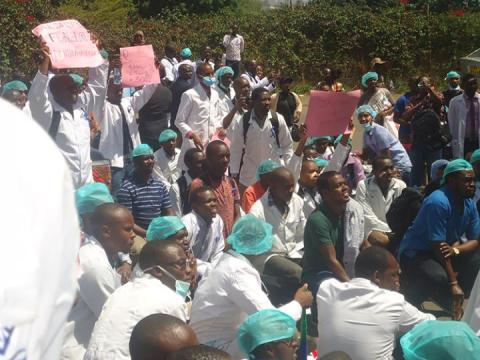
Recently, I needed medical care for my young family. It was on a Sunday afternoon, and had just left another hospital to care for the sick and now I needed similar services. This hospital is among the top three preferred hospitals in Nairobi yet despite that I work for it, I cannot afford healthcare services in that institution. They do not accept the National Health Insurance Fund (NHIF) cards issued to most doctors working in government, ironically they deposit monthly remittances to my NHIF account too.
On my way from working, I was stopped by a policeman on a roundabout on allegations that I had driven on a wrongful lane. After inspecting the vehicle, he climbed in and alluded to arrest me for my crime. He directed me to drive towards the police station, of which I did humbly. Soon, we engaged in a heated conversation that he had wrongfully arrested me but instead of taking me to the station we could settle the matter. He quoted his price and I quoted mine. He declined my offer which was four times less than the Ksh. 2000 he had quoted. I did not have the money.
I told him of my intention that late afternoon to take my family to hospital, but in a condescending voice he said, “Kila mtu ako na shida, wewe twende kwa station,” (everybody has a problem, let’s just go to the police station.) I knew my goose was cooked.
In an outburst of anger and confidence, I shouted to him, “You can take me wherever you want, but one thing I know for sure, I will not die.” Those words sank in him slowly and he was silent for a moment, then he said softly, “Pack on the side,” as he pointed with his index finger. I slowly packed the vehicle.
To be honest I did not have money in my pocket right there. Luckily that morning, a friend had sent me some money he owed me which was still in my Mpesa account and it was so meager that it would not last me to end month which was a few days away which means I could easily go into a spree of debt. Now this policeman was threatening to take the entire cake but since I had been cornered, I was ready to give a piece of the cake. That became my strategy.
After packing, he started narrating to me how people were suffering, how some people could not afford to have a vehicle on the road yet here I was with one albeit a cheap one, how others were sick in hospital, how others did not have food, how others were facing death sentence and finally he gave me a glimpse of hope, that Uhuru and Ruto overcame ICC cases to become Kenya’s top leaders, inspired by a billboard directly in-front of our temporary roadside packing with the two national leaders clenching fists together in solidarity, tuko pamoja. (Together we are)
I listened politely, without interrupting, nodding perceptively, as I always do and had done the previous five hours, as a doctor. He did not know that I was one. He gave me lots of advice, that I was a young man, with a lot of future and aspirations and that I had every responsibility to live up to my dreams and take care of my family. That my problems were not mine alone but everybody’s which also construed that he had a lot problems too. He actually did and looked so, but probably was afraid to confess directly.
Finally, he asked me for a piece of the cake. I told him that the money was in the Mpesa account, we drove back, past the roundabout to an Mpesa shop, withdrew the money, handed him his share, dropped him at a junction and headed my way home to address my family’s health problem. The ordeal had taken about forty-five minutes.
At home we mobilized ourselves and left for the hospital. We went to a hospital in close proximity to our home, and one we thought offered modest care. Shock and awe, they never accepted NHIF cards except for maternity services and we could not get general consultation services there. On a quick internet browsing, we got phone numbers of another hospital, which informed us that we could get services based on my seniority in government as described by my job group, but at that particular time, Sunday evening, it was impossible since the NHIF systems were not working. Because our health problems were not an emergency, we decided to go the following day, Monday, for the investigations and treatment.
As we drove back home, we kept reflecting with my wife on how injustice had been meted to doctors, that we could not get treatment for the very services we offered, that had it been an emergency we would be in so much trouble. That as Kenyans we deserved better. I reflected on my events with the policeman realizing, that him and me were in solidarity, tuko pamoja, with the struggles of the common mwananchi, lack of access to basic credible health care services.
A week later, I would be tear-gassed by the policemen as I matched in solidarity with other doctors outside Kenya’s Ministry of Health Headquarters, Afya House, near the mentioned billboard as we agitated for a decent pay. #LipaKamaTender